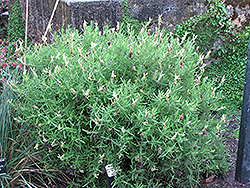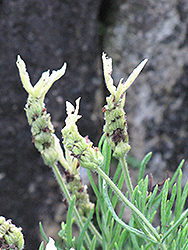Height: 24 inches
Spread: 3 feet
Sunlight:
![]()
Hardiness Zone: 7b
Other Names: Spanish Lavender
Description:
Lovely and aromatic, this flowering shrub is covered with long-blooming flowers which feature showy pale yellow petals at the top, and chartreuse bracts; ideal for borders, cottage gardens, and containers
Ornamental Features
Lemon Leigh Lavender has masses of beautiful spikes of fragrant buttery yellow flowers with chartreuse bracts rising above the foliage from late spring to early fall, which are most effective when planted in groupings. The flowers are excellent for cutting. It has attractive grayish green evergreen foliage. The fragrant needles are highly ornamental and turn coppery-bronze in the fall, which persists throughout the winter.
Landscape Attributes
Lemon Leigh Lavender is a dense multi-stemmed evergreen shrub with a mounded form. It lends an extremely fine and delicate texture to the landscape composition which should be used to full effect.
This is a relatively low maintenance shrub, and can be pruned at anytime. It is a good choice for attracting bees and butterflies to your yard, but is not particularly attractive to deer who tend to leave it alone in favor of tastier treats. It has no significant negative characteristics.
Lemon Leigh Lavender is recommended for the following landscape applications;
- Mass Planting
- Rock/Alpine Gardens
- Border Edging
- General Garden Use
- Container Planting
Planting & Growing
Lemon Leigh Lavender will grow to be about 24 inches tall at maturity, with a spread of 3 feet. It tends to fill out right to the ground and therefore doesn't necessarily require facer plants in front. It grows at a slow rate, and under ideal conditions can be expected to live for approximately 10 years.
This shrub should only be grown in full sunlight. It prefers dry to average moisture levels with very well-drained soil, and will often die in standing water. It is considered to be drought-tolerant, and thus makes an ideal choice for a low-water garden or xeriscape application. It is not particular as to soil type, but has a definite preference for alkaline soils, and is able to handle environmental salt. It is highly tolerant of urban pollution and will even thrive in inner city environments. This is a selected variety of a species not originally from North America.
Lemon Leigh Lavender makes a fine choice for the outdoor landscape, but it is also well-suited for use in outdoor pots and containers. It can be used either as 'filler' or as a 'thriller' in the 'spiller-thriller-filler' container combination, depending on the height and form of the other plants used in the container planting. It is even sizeable enough that it can be grown alone in a suitable container. Note that when grown in a container, it may not perform exactly as indicated on the tag - this is to be expected. Also note that when growing plants in outdoor containers and baskets, they may require more frequent waterings than they would in the yard or garden.
Disclaimer - This resource is provided for informational purposes only and does NOT reflect current availability. Inventory varies seasonally, so we cannot guarantee that every plant will be in stock at all times - please contact your favourite GardenWorks location directly for current availability. It does not include our entire inventory of plants, so be sure to visit GardenWorks to see varieties that may not be represented on this list.


